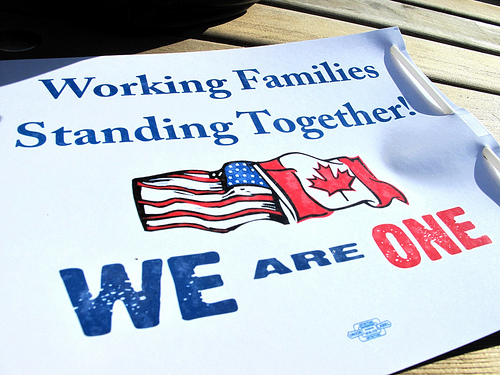On Saturday, April 2, a “We Are One” rally was jointly organized by the B.C. Federation of Labour and the Washington and Oregon arms of the AFL-CIO and its labour councils. Held on the U.S. side of the international Peace Arch border crossing, at our count more than two thousand rallied in solidarity with workers in Wisconsin.
There were speakers from both sides of the border, including the B.C. Federation of Labour’s Jim Sinclair, CFS Chairperson Nimmi Takkar, and a spirited speech by the Canadian Labour Congress President Ken Georgetti. With a host of creative and colourful banners and props, as well costumed performers mingling amidst the cherry blossoms on a sunny West Coast afternoon, the rally could have been mistaken for a festival. However the messages shared by speakers and banners belied the festive atmosphere: long fought for labour rights are under attack in an unprecedented way, and if workers and allies don’t work together, will be lost. As Jim Sinclair explained:
“What they are trying to do is destroy the most precious thing the labour movement has. That precious thing is our solidarity with each other as human beings and as working people…. Those folks in power hate that solidary… They really hate it when we have power because of we have solidarity… In Wisconsin, they are breaking the labour movement to destroy collective bargaining. They are attacking the very things we have fought for years to win… but they are not just attacking the working people, because who stands up for public education? Who stands up and fights for health care? Who stands up against poverty? Who stands up for justice and equality? Its the labour movement.”
Here are some images from the rally (for more images, click here.)




Marking the anniversary of Dr. Martin Luther King’s assassination, and King’s support for striking Memphis sanitation workers, this rally is just one of many held across the U.S. this week for the National Day of Action. The rallies protest Wisconsin governor Scott Walker’s controversial bill stripping collective bargaining rights from the state’s public workers.



